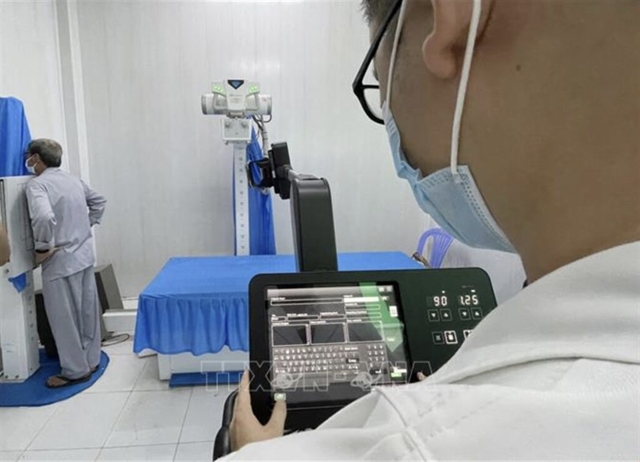 Society
Society

 |
| An X-ray is taken of a patient using a machine integrated with artificial intelligence. — VNA/VNS Photo |
HÀ NỘI — Digital transformation in all fields is a vital trend and a mandatory requirement for countries that want to enhance economic development, improve quality of life, and promote social progress and prosperity, said Minister of Health Đào Hồng Lan.
Healthcare is one of eight priority areas for digital transformation which is expected to be a driving force for the sector’s development to better serve people, the minister told a meeting reviewing digital transformation work in 2023 and plan for 2024 held by the Ministry of Health in Hà Nội on Wednesday.
With the message "Connect - Share - Accompany", the conference demonstrated the strong commitment of the Ministry of Health to connect the central and local levels in digital transformation in medical work.
Lan said: “In digital transformation, moving from awareness to action is very important.”
“The Ministry of Health has determined that promoting digital transformation is a major programme, a key direction and response to the current situation,” she said.
“By 2030, digital transformation will create conditions for people to access medical services promptly and effectively, and serve the ministry’s management and administration work clearly and transparently to meet people's needs in a quick and suitable manner,” the minister said.
In the meeting, the minister reviewed the digital transformation results that the health sector has achieved in recent times, contributing to bringing many innovations to the health sector such as helping reduce health care and travel costs of people and businesses, and facilitating management, examination, testing and treatment through electronic medical records. However, there are still limitations and shortcomings to overcome.
The legal basis for promoting digital transformation and innovation is not appropriate, information technology infrastructure is not commensurate with the volume of data managed by the health sector, the technology platform for digital transformation in healthcare is still fragmented, and network security is also a concern, the minister said.
To enhance health digital transformation, in the near future, the ministry will develop a national digital database to create a foundation for digital government, ensuring the provision of digital data for online public services, smooth sharing of data between State agencies.
The ministry will also develop and approve dossiers proposing information system security levels and implement plans to ensure information security and network security according to the provisions of law, as well as create a digital database for the health sector to meet the requirements of connection and sharing of information and data resources.
In addition, the ministry will direct the implementation of technical solutions and plans to develop medical digital infrastructure at local level, and build specialised database systems including medical examination, treatment, preventive medicine, human resources, medical equipment and pharmaceuticals in accordance with the direction of decentralisation of management from central to local levels.
Units have to complete the national healthcare database, and apply digital technologies to effectively exploit data on the basis of taking people as the centre and electronic health records as the core to digitise people's health data.
In the conference, the participating units also introduced digital medical platforms such as remote medical examination, treatment and consultation, electronic health record, evaluation of platform implementation, tasks of ensuring information and network security, and data encryption attacks (ransomware), and medical information security training courses. — VNS





 Brandinfo
Brandinfo